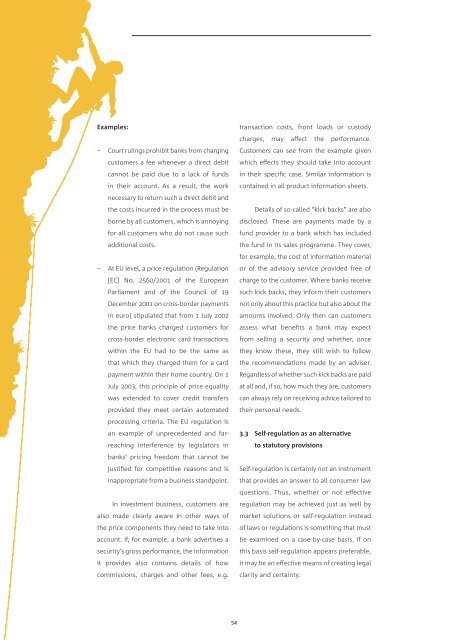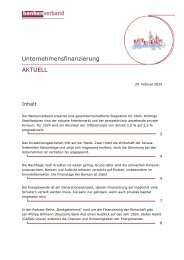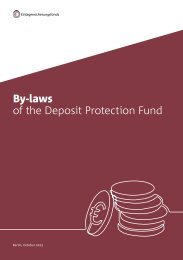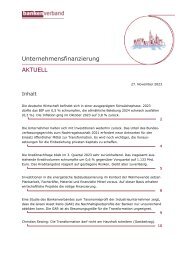Banks and Consumers
The Comprehensive Consumer Policy Scheme of the German Private Commercial Banks
The Comprehensive Consumer Policy Scheme of the German Private Commercial Banks
You also want an ePaper? Increase the reach of your titles
YUMPU automatically turns print PDFs into web optimized ePapers that Google loves.
BANKS AND CONSUMERS<br />
Examples:<br />
− Court rulings prohibit banks from charging<br />
customers a fee whenever a direct debit<br />
cannot be paid due to a lack of funds<br />
in their account. As a result, the work<br />
necessary to return such a direct debit <strong>and</strong><br />
the costs incurred in the process must be<br />
borne by all customers, which is annoying<br />
for all customers who do not cause such<br />
additional costs.<br />
− At EU level, a price regulation (Regulation<br />
[EC] No. 2560/2001 of the European<br />
Parliament <strong>and</strong> of the Council of 19<br />
December 2001 on cross-border payments<br />
in euro) stipulated that from 1 July 2002<br />
the price banks charged customers for<br />
cross-border electronic card transactions<br />
within the EU had to be the same as<br />
that which they charged them for a card<br />
payment within their home country. On 1<br />
July 2003, this principle of price equality<br />
was extended to cover credit transfers<br />
provided they meet certain automated<br />
processing criteria. The EU regulation is<br />
an example of unprecedented <strong>and</strong> farreaching<br />
interference by legislators in<br />
banks’ pricing freedom that cannot be<br />
justified for competitive reasons <strong>and</strong> is<br />
inappropriate from a business st<strong>and</strong>point.<br />
In investment business, customers are<br />
also made clearly aware in other ways of<br />
the price components they need to take into<br />
account. If, for example, a bank advertises a<br />
security’s gross performance, the information<br />
it provides also contains details of how<br />
commissions, charges <strong>and</strong> other fees, e.g.<br />
transaction costs, front loads or custody<br />
charges, may affect the performance.<br />
Customers can see from the example given<br />
which effects they should take into account<br />
in their specific case. Similar information is<br />
contained in all product information sheets.<br />
Details of so-called “kick backs” are also<br />
disclosed. These are payments made by a<br />
fund provider to a bank which has included<br />
the fund in its sales programme. They cover,<br />
for example, the cost of information material<br />
or of the advisory service provided free of<br />
charge to the customer. Where banks receive<br />
such kick backs, they inform their customers<br />
not only about this practice but also about the<br />
amounts involved. Only then can customers<br />
assess what benefits a bank may expect<br />
from selling a security <strong>and</strong> whether, once<br />
they know these, they still wish to follow<br />
the recommendations made by an adviser.<br />
Regardless of whether such kick backs are paid<br />
at all <strong>and</strong>, if so, how much they are, customers<br />
can always rely on receiving advice tailored to<br />
their personal needs.<br />
3.3 Self-regulation as an alternative<br />
to statutory provisions<br />
Self-regulation is certainly not an instrument<br />
that provides an answer to all consumer law<br />
questions. Thus, whether or not effective<br />
regulation may be achieved just as well by<br />
market solutions or self-regulation instead<br />
of laws or regulations is something that must<br />
be examined on a case-by-case basis. If on<br />
this basis self-regulation appears preferable,<br />
it may be an effective means of creating legal<br />
clarity <strong>and</strong> certainty.<br />
54


















